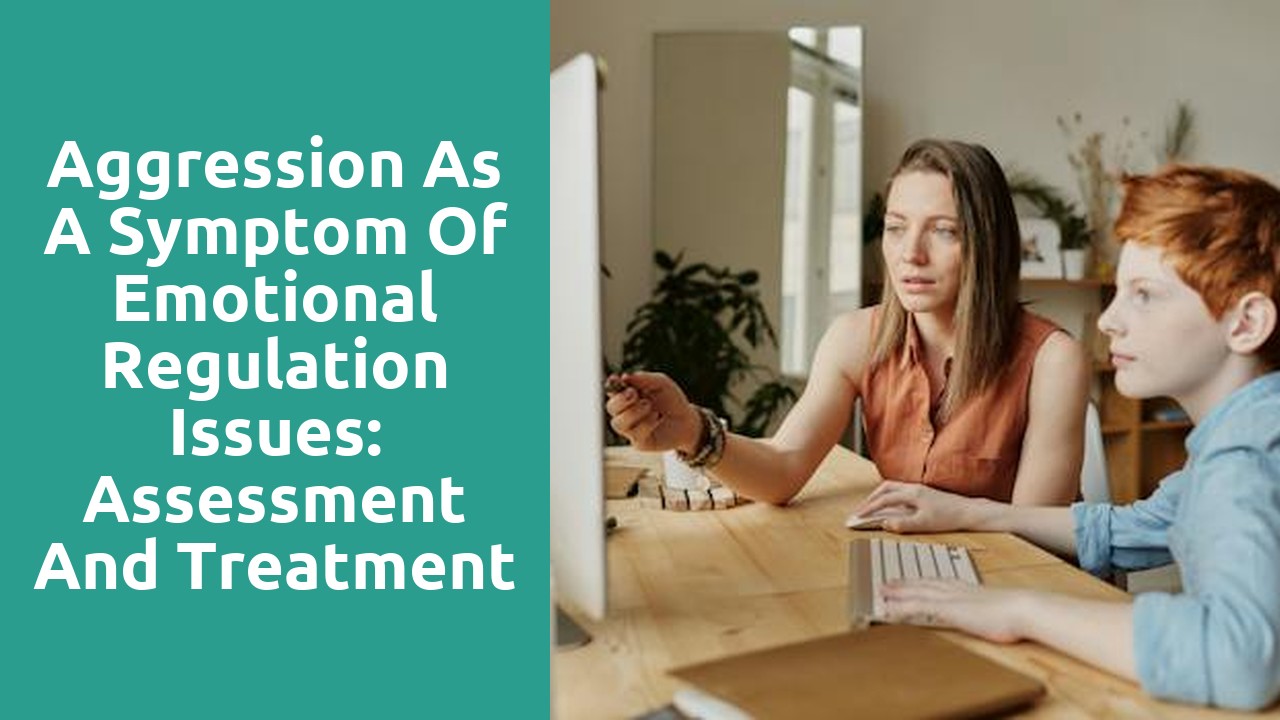

Emotional regulation and aggression are two closely intertwined concepts that have long fascinated researchers and psychologists. While it is easy to assume that aggression stems solely from anger or frustration, the reality is far more complex. As we delve deeper into the link between emotional regulation and aggression, we begin to uncover a nuanced relationship where unmanaged emotions can give rise to aggressive behaviors.
Emotional regulation, often referred to as the ability to control and manage one's emotions, plays a crucial role in shaping our behavior and responses to external stimuli. When individuals struggle with emotional regulation, they may find it challenging to navigate and regulate their emotions effectively. As a result, these individuals may be more prone to experiencing heightened levels of stress, anger, and frustration, leading to a higher likelihood of engaging in aggressive behaviors. Understanding this connection is essential in order to develop effective strategies and interventions that can help individuals with emotional regulation issues manage their aggression more effectively.
Understanding the underlying factors behind aggressive behavior requires a deep exploration into the hidden emotions that fuel such actions. Aggression is often seen as a surface-level reaction, but beneath the anger and hostility lies a complex web of emotions. These hidden emotions can range from fear and insecurity to frustration and inadequacy. By delving into these underlying factors, we can gain a better understanding of why individuals exhibit aggressive behavior and, more importantly, how we can address these issues effectively.
One key factor that contributes to aggressive behavior is a lack of emotional regulation skills. Emotions serve as a compass, guiding our actions and reactions. However, for individuals with limited emotional regulation abilities, these emotions can become overwhelming and uncontrollable. This inability to manage emotions effectively can lead to outbursts of aggression as a way to release the built-up tension and frustration. By exploring this aspect further, we can develop targeted strategies and interventions to help individuals develop stronger emotional regulation skills, enabling them to address their hidden emotions in a healthier manner.
The effects of emotional regulation issues on aggression are not to be underestimated. Numerous studies have been conducted to assess the impact of these issues on individuals and society as a whole. The results consistently demonstrate the profound consequences that can arise when emotional regulation is compromised.
One of the most concerning findings is the increased likelihood of aggressive behavior in individuals with poor emotional regulation skills. These individuals struggle to control their emotions, leading to heightened levels of anger, frustration, and hostility. As a result, they may resort to physical or verbal aggression as a means to release or express these intense emotions. Such aggression can have far-reaching effects, not only on the individual but also on their relationships, social interactions, and overall well-being.
When it comes to managing aggression in individuals with emotional regulation issues, adopting a holistic approach is key. It is crucial to recognize that aggression often stems from underlying emotions that may not be expressed in a healthy manner. By acknowledging and addressing these emotions, we can begin to break the cycle of aggression.
One effective strategy is to provide individuals with alternative outlets for their emotions. This can include engaging in physical exercise, such as sports or yoga, which can help release pent-up energy and alleviate stress. Additionally, encouraging individuals to express their emotions through creative outlets, such as art or journaling, can provide a safe space for them to explore and process their feelings. By offering these alternative outlets, individuals with emotional regulation issues can learn healthier ways to cope with their emotions, reducing the likelihood of resorting to aggression.
Individuals who experience aggressive outbursts often struggle to identify the key triggers that contribute to their explosive behaviors. It is crucial to unmask these triggers to better understand and address the underlying factors that lead to aggression. One of the primary factors that contribute to aggressive outbursts is unmet emotional needs. When individuals do not have their emotional needs met, it can lead to feelings of frustration, anger, and irritability, which may manifest as aggressive behavior. It is essential to recognize the importance of emotional needs and to provide individuals with the necessary support and resources to effectively regulate and express their emotions in a healthy manner.
Emotional regulation disorders can often manifest in aggressive behavior, leaving individuals struggling to manage their emotions and control their impulses. While the connection between emotional regulation and aggression has been widely acknowledged, delving deeper into the roots of this aggression reveals a complex interplay of underlying factors. It is important to understand that aggression in individuals with emotional regulation disorders can stem from a combination of genetic predispositions, environmental influences, and neurological abnormalities.
One key factor that contributes to aggressive outbursts in individuals with emotional regulation disorders is a difficulty in effectively recognizing and labeling emotions. Research suggests that individuals who struggle with emotional regulation may have impaired emotional awareness, making it challenging for them to accurately identify their own emotions and differentiate them from physical sensations or thoughts. This lack of emotional awareness can lead to a build-up of frustration, anger, or irritability, which may ultimately result in aggressive behavior as a maladaptive coping mechanism. By recognizing and addressing this underlying issue, interventions can be tailored to improve emotional awareness skills and help individuals develop alternative strategies for managing their emotions.